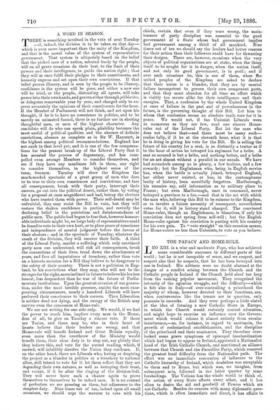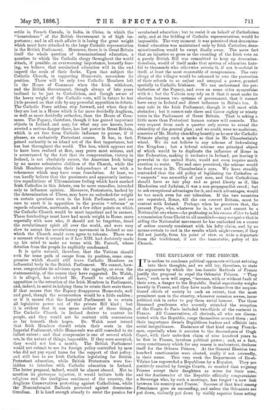THE PAPACY AND HOME-RULE.
E0 XIII. is a wise and moderate Pope, who has achieved
J some considerable successes in different parts of the world ; but he is not incapable of error, and we suspect, and suspect also that he suspects, that he has been betrayed into one in Ireland. His advisers were no doubt alarmed at the danger of a conflict arising between tbe Church and the Catholic people in Ireland if the Church held aloof too long from the rushing pOpular movement. They recognised the intensity of the agrarian struggle, and the difficulty—which is felt also in Italy—of over-controlling a priesthood the majority of whom, however devoted to their functions, are, when controversies like the tenure are in question, only peasants in cassocks. And they were perhaps a little elated at the idea of forming a new Catholic State in Europe, in which the Church would certainly control education, and might hope to exercise an influence over the Govern- ment which would release it almost entirely from secular interference,—as, for instance, in regard to mortmain, the growth of ecclesiastical establishments, and the discipline of the priesthood and their seminaries. They therefore over- looked some grave symptoms of episcopal insubordination which had begun to appear in Ireland, appointed a Nationalist head of the Irish Catholic Church, and sanctioned an alliance between that Church and the Parnellite Party, which removed the greatest local difficulty from the Nationalist path. The effect was an immediate restoration of influence to the Catholic hierarchy of Ireland, which doubtless was acceptable to them and to Rome, but which was, we imagine, from subsequent acts, followed in the latter quarter by some forebodings. The Vatican has the whole world to think of, the action of every State affects every other, and it has often to desire the aid and goodwill of Powers which are not Catholic. Besides its concern with many diplomatic ques- tions, which is often immediate and direct, it has affairs to
settle in French Canada, in India, in China, in which the "benevolence" of the British Government is of high im- portance ; and in all such affairs it is losing the great weight which must have attached to the large Catholic representation in the British Parliament. Moreover, there is in Great Britain itself the whole question of denominational education, a question to which the Catholic clergy throughout the world attach, if possible, an overweening importance, honestly fear- ing, we believe, that secularised education will in the end imperil the souls of their flocks. Upon that subject the Catholic Church, in supporting Home-rule, surrenders its position. There will be only two Catholic Members left in the House of Commons when the Irish withdraw, and the British Government, though always of late years inclined to be just to Catholicism, and though aware of the heavy weight of the Catholic vote, will in future be but little pressed on that side by any powerful opposition in debate. The Catholic Peers seldom step forward, and when they do they are lost in a House which is far more decidedly Anglican, as well as more decidedly orthodox, than the House of Com- mons. The Papacy, therefore, though it has gained important objects in Ireland, and may, for what any one knows, have averted a serious danger there, has lost power in Great Britain, which is set free from Catholic influence to pursue, if it pleases, an exclusively Protestant course. It has, in fact, gained authority in an island not of the first importance, but has lost throughout the world. The loss, which appears not to have been realised at first, may prove most serious, and is accentuated by the fact that its compensation, victory in Ireland, is not absolutely secure, the American Irish being by no means submissive children of the Church, while the Irish Members proclaim their independence of her with a vehemence which may have some foundation. At least, we can hardly believe that the passionate and apparently instinc- tive repudiations of Ultramontane feeling which have marked Irish Catholics in this debate, can be mere comedies, intended only to influence opinion. Moreover, Protestants, backed by the determination of Ulster, may have an unlooked-for weight on certain questions even in the Irish Parliament, and are sure to exert it in opposition to the precise " reforms " as regards education, mortmain, and a few other points on which the Catholic Church would be most impatient and in earnest. These forebodings must have had much weight in Rome, more especially with men who, it should not be forgotten, dread the revolutionary spirit all over the world, and were very slow to accept the revolutionary movement in Ireland as one which the Church could even agree to tolerate. There was a moment when it seemed as if Leo XIII. had decisively made up his mind to make no terms with Mr. Parnell, whose dotation from the people he explicitly condemned.
It is quite natural, therefore, that the Vatican should seek for some path of escape from its position, some com- promise which should still leave Catholic Members an influential body in the British Parliament. We cannot, how- ever, congratulate its advisers upon the sagacity, or even the statesmanship, of the course they have suggested. Dr. Walsh, it is alleged, has advised Mr. Parnell to withdraw all opposition to the retention of the Irish Members in Parliament, and, indeed, to assist in helping them to retain their seats there. If that means that the Papacy disapproves Home-rule, well and good, though the reconversion would be a little sudden ; or if it means that the Imperial Parliament is to retain all legislative power not of the private Bill kind ; but it is evident that it can mean neither of these things. The Catholic Church in Ireland desires to content its people, and they would not be content with concessions so far beneath their hopes. Dr. Walsh must intend that Irish Members should retain their seats in the Imperial Parliament, while Home-rule was still conceded to its fullest extent ; and that compromise is one of several which are, in the nature of things, impossible. If they were accepted, they would not last a month. The British Parliament would not submit to see its foreign policy controlled by men who did not pay equal taxes for the support of that policy; and still less to see Irish Catholics legislating for British Protestant education, while British Protestants were for- bidden to interfere with Catholic education in Ireland. The latter 'proposal, indeed, would be almost absurd. Not to mention its grotesque injustice, it would irritate both the religious and the irreligious sentiment of the country, the Anglican Conservatives protesting against Catholicism, while the Nonconformist Radicals protested against denomina- tionalism. It is hard enough already to resist the passion for secularised education ; but to resist it on behalf of Catholicism only, and at the bidding of Catholic representatives, would be impossible. The very moment it was perceived that denomina- tional education was maintained only by Irish Catholics, deno- minationalism would be swept finally away. The mere fact that an injustice so gross as the counting of the Irish vote on a purely British Bill was committed to keep up denomina- tionalism, would of itself make that system of education hate- ful to thousands who otherwise esteem it, if not benefioial in itself, at least the most reasonable of compromises. The very clergy of the villages would be ashamed to owe the protection of their schools to so unjust and unequal a power, granted specially to Catholic Irishmen. We can understand the per- turbation of the Papacy, and even on some sides sympathise with it ; but the Vatican may rely on it that it must make its election between two systems of government, that it cannot have sway in Ireland and direct influence in Britain too. It may rule in the Irish Parliament, though it will meet with obstacles ; but it cannot rule there and throw eighty or ninety votes in the Parliament of Great Britain. That is asking a little more than Protestant human nature will concede. The very request from such a quarter only serves to reveal the absurdity of the general plan ; and we could, were we malicious, conceive of Mr. Morley chuckling heartily as he saw the Catholic Primate placing such a spoke as that in Mr. Chamberlain's wheel. We do not believe in any scheme of federalising the Kingdom ; but a federal scheme one principal object of which would be to duplicate the influence of Rome in the Federation, making it exclusive in Ireland, yet leaving it powerful in the united State, would not even require much exertion to resist. The end once perceived, the scheme would be dead even in Mr. Chamberlain's eyes. We have steadily contended that the old policy of legislating for Catholics as " suspects " was unworthy of just men, and that Catholicism should have as fair play and as great liberty as if, like Hindooism and Judaism, it was a non-propagandist creed ; but to ask exceptional advantages for it, and such advantages, would be too much even for our toleration. If the two countries are separated, Rome, till she can convert Britain, must be content with Ireland. Perhaps when he perceives that, the present Pope, who, whatever he is, is not and cannot be a Nationalist anywhere—he professing as his raison d'are to hold a commission from Christ to all mankind—may recognise that in aiding the Nationalist movement he has embarked on a course of action scarcely consistent with his lofty claim, and by no means certain to end in the results which might excuse, if they did not justify, from his point of view, so wide a departure from the traditional, if not the immutable, policy of his Church.



































 Previous page
Previous page